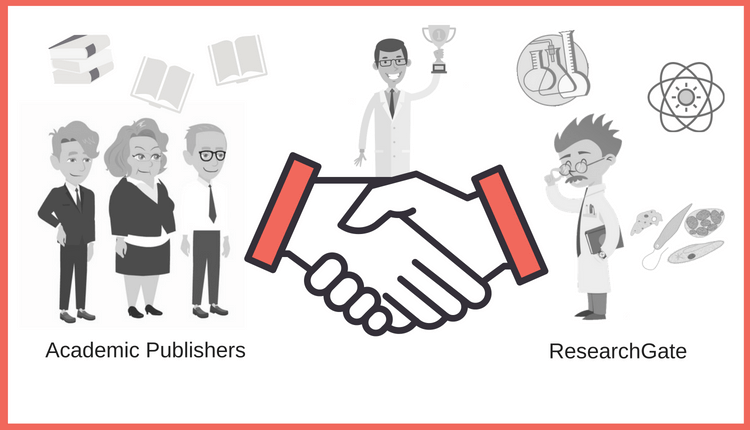Academic Publishers Form a Coalition With ResearchGate

After months of conflict relating to copyright and open access infringement, ResearchGate appears to be on the road to recovery. It has recently signed an agreement to collaborate with giant publishers like Springer Nature, Cambridge University Press and Thieme. Such an alliance would ensure the scholarly article platform consistently protects the rights of publishers and authors. How exactly will this agreement, change or resolve the conflicting recent past of the platform? Let us read ahead to find out.
Copyright Infringement and ResearchGate
ResearchGate is an academic community platform that allows researchers to upload their publications as published in academic journals. It allows broader engagement with the scholarly content while improving the citation index of researchers. However, most of these ResearchGate publications have copyright specifications preventing their open-access availability. As the research community engaged on the platform increased, the number of publications that infringed copyright reached a massive scale. These several issues of copyright infringement led to a backlash by the publishing industry. This, in turn, resulted in the establishment of the coalition for responsible sharing. However, attempted negotiations between the publishers, including Wiley and Elsevier with ResearchGate did not culminate in a productive outcome. The situation progressed towards legal action against the academic platform.
Terms of Agreement Between Publishers and ResearchGate
The newly announced cooperation agreement between publishers and ResearchGate aims to educate all users of their rights as authors. Besides that, it also aims to make the publishers aware of their responsibility to secure copyrights. In accordance with the agreement, ResearchGate will remove content infringing copyrights from its site. Likewise, publishers will be notified when any publication from their journals is archived on ResearchGate.
Moreover, this agreement will take a step in the right direction by creating an educated user-content platform, as opposed to asserting rules. Accordingly, ResearchGate will monitor the site for any article that violates this agreement, promptly taking down content to prevent disagreement.
Push Notifications for the Publication Industry
As mentioned before, ResearchGate will notify publishers when their content becomes available on the site. Visibility to copyright content shared on the platform will provide transparency that was sorely lacking on ResearchGate to begin with. This agreement does not resolve all publication conflicts, including the rights to ensure open-access for all research publications. However, we see a rise from ongoing dispute to form plausible arrangements among the users, for scholarly research access.
This constructive effort comes on the heels of a few other such collaborative efforts among publishers for journal-based research access. Recently, Figshare an online repository for research data, collaborated with Springer Nature to launch a new tool supporting open research. This new tool allows authors and journals to follow good practice in data-sharing and research archival, resembling current collaborations with ResearchGate. Building up on the previous research data, the service provides a platform to submit/store private datasets securely. Authors are also able to provide open access to their research data, according to the Creative Commons attribution license.
Moving in the Right Direction in Research
In academic publications, the authors (researchers) strive to ensure higher visibility for scholarly publications. The coalition with ResearchGate allows researchers and publishers to find common grounds to disseminate knowledge while increasing article-based citations for career advancement. Forming an alliance to share research-publications does not resolve all related conflicts, yet forms a first-step in the right direction. It shows that a common ground of shared responsibility can be found among the individuals involved, enabling strengthened research commitments.
How far do you think this agreement will be successful in its fight against copyrigt infringement? Please share your thoughts with us in the comments section below.







These publishers just work like a mafia making a profit off other people’s work. They are trying to bar the authors/researchers from sharing their work just because they are not getting their cut from a work that they (the publishers) have zero contribution in. The result of all this mess would be that the authors/researchers would eventually just give up on them and publish in the open community.